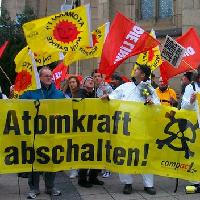
Government pushed into defensive by Fukushima disaster and mass unrest
Following the Fukushima nuclear disaster in Japan the movement against nuclear energy in Germany has gained new momentum. In Germany, the issue of nuclear power has been a major controversy since the 1970’s. This gave rise to the emergence of the Green Party and mass mobilisations against the building of nuclear power stations and nuclear waste transports. Some of these mobilisations successfully stopped the building of power plants.
For some years there was a lull in the protests, but since 2009 a growing mass movement had developed around this issue after a conservative-liberal government came into office and prolonged the lifetime for Germany’s nuclear power stations. The Social Democratic and Green coalition government, which governed the country from 1998 to 2005, agreed to a compromise with the energy corporations to slowly phase out nuclear energy. Socialists and the more radical wing of the anti-nuclear movement warned that this compromise, in reality, meant a guarantee for the corporations to continue making huge profits out of nuclear energy for many years and that a change in government could mean an end to this agreement. This is what happened after 2009. Since then, several big protests had taken place in which the Green Party and the Social Democrats hypocritically participated. Around 100,000 marched through Berlin in autumn 2010. More importantly, mass blockades, involving many thousands of activists and local residents, took pace against nuclear waste transports, also in late 2010 (see reports on socialistworld.net). Now this movement has gained new momentum through the terrible events in Japan.
On Monday, 14 March, 110,000 people demonstrated in hundreds of cities. On 21 March, this grew to 140,000, and involved almost 700 towns and cities. For 26 March, four regional mass demonstrations are planned in Hamburg, Cologne, Berlin and Munich. Hundreds of thousands are expected to take part.
No trust in government and politicians
This movement is developing despite the fact that the Merkel administration quickly tried to react to the Fukushima disaster and the popular mood against nuclear energy in Germany (every opinion poll shows a big majority in favour of phasing out nuclear energy). They announced a three-month-moratorium of the deal with the energy corporations to prolong the duration of the nuclear power plants which led to the eight oldest and least secure plants being shut down for the time of the moratorium. It is openly discussed amongst government politicians that these plants might never be brought back into use again.
But these measures were not enough to stop a mass movement developing. This also reflects the complete lack of trust by millions in the government and all established politicians. The conservative and liberal coalition is especially seen as servants of the big energy corporations. The response to Fukushima can be seen on the streets but also in the ballot box. In regional elections in the East German state of Saxony-Anhalt, the turnout went up (to little above 50 percent) with a strong increase for the Green Party, which traditionally is very weak in the East, gaining seven percent.
Socialist Alternative (CWI Germany) members energetically intervene in the mass movement demanding the immediate shutting down of all nuclear power plants in Germany – which is entirely possible given the big overcapacity of Germany’s energy plants – in contrast to the step-by-step approach of the Greens and Social Democrats. We explain that a sustainable energy policy is only possible on the basis of democratic planning, so that investment can be made into renewable energies and that the end of nuclear energy does not necessarily lead to a higher increase in carbon emissions. Our slogan for next Saturday’s demonstrations is: ‘Capitalism kills. Expropriate the nuclear power corporations!’
In a number of cities, young SAV members and the youth wing of the Left Party took the initiative to establish a youth campaign called, “Youth Action ’Switch them off NOW’”. Its first meetings and protest actions are due to take place this week.

Be the first to comment